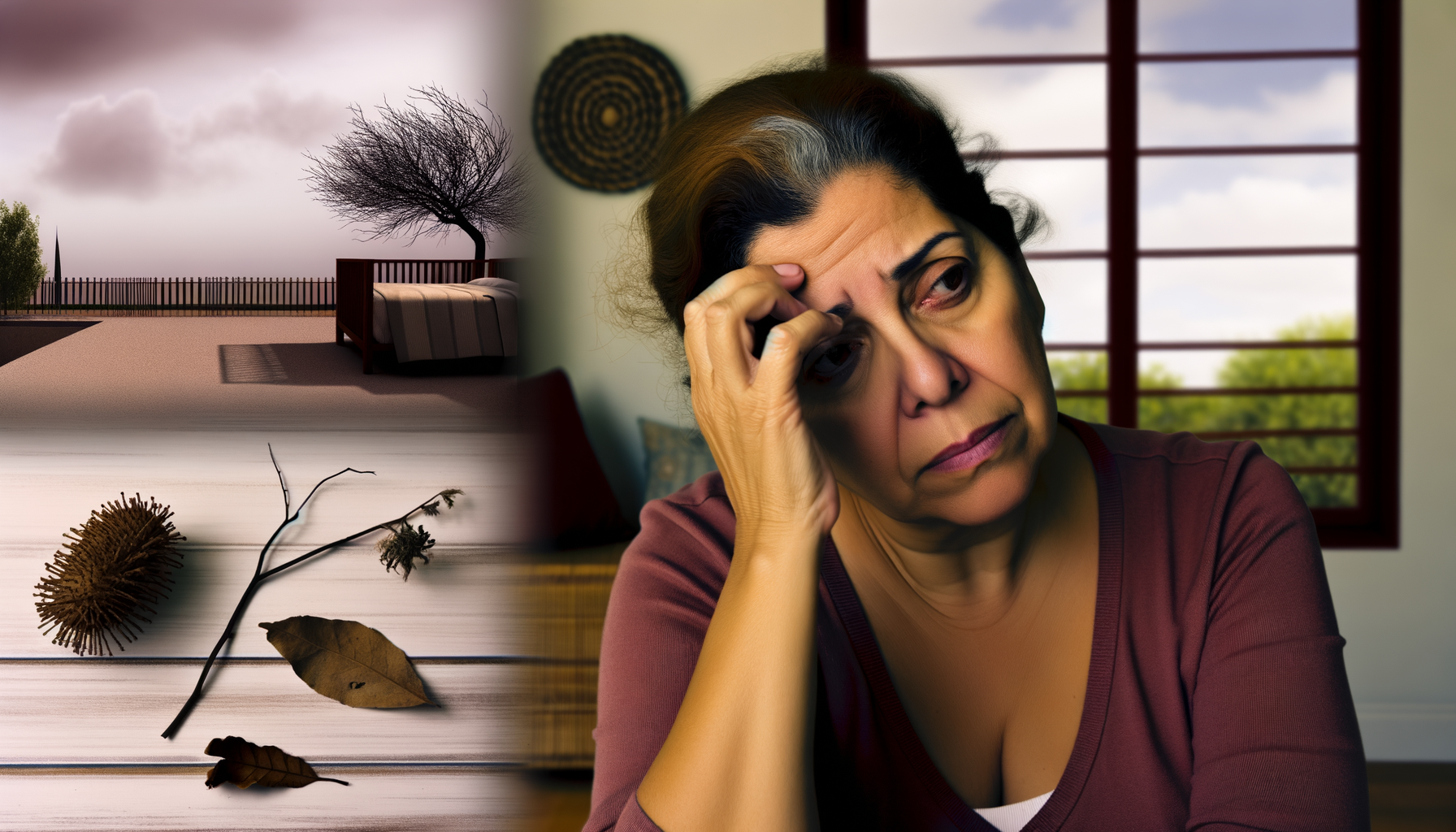The feeling of doom during menopause is an unsettling sensation that something catastrophic is imminent, despite no apparent danger. This feeling can manifest suddenly or develop over time, and while it may be a normal response to a genuine threat, experiencing it in a safe environment is atypical. It is often linked to anxiety or depression and can be particularly pronounced during menopausal transitions.
Prevalence Among Menopausal Women
Many women going through perimenopause and menopause report experiencing this feeling of doom. While not every menopausal woman will experience it, it is a significant enough phenomenon to warrant attention. The decline in hormones such as progesterone and estrogen can contribute to these feelings, as these hormones are involved in regulating mood and stress responses.
Distinguishing Between Normal Anxiety and Menopausal Doom
It is crucial to differentiate between general anxiety, which can be a normal part of life’s stressors, and the more acute feeling of doom that can accompany menopause. Normal anxiety is typically transient and manageable, while menopausal doom can feel overwhelming and persistent, often without a clear cause. This distinction is important for understanding and addressing the emotional turmoil experienced during menopause.
Biological and Psychological Triggers
The onset of menopausal doom can be attributed to both biological and psychological triggers. Hormonally, the reduction in progesterone and estrogen levels leads to a decrease in their calming effects and an increase in cortisol, the stress hormone. This hormonal upheaval can activate the amygdala, the brain’s fear center, heightening feelings of dread. Psychologically, menopause often coincides with significant life stressors such as caring for aging parents, relationship changes, and financial concerns, which can exacerbate the emotional experience. Understanding these triggers is the first step towards managing this complex symptom of menopause.
The Hormonal Shifts Contributing to Emotional Turmoil
The menopausal transition is marked by significant hormonal shifts, particularly in the levels of estrogen and progesterone. These hormones have been closely linked to mood regulation throughout a woman’s life. Estrogen, the primary female sex hormone, has neuroprotective properties and modulates neurotransmitter systems associated with mood. Progesterone, on the other hand, has a calming effect on the brain. During menopause, the fluctuating and overall decline in these hormones can lead to mood swings and emotional distress. Research suggests that these hormonal changes can exacerbate symptoms of depression and anxiety, particularly in women with a history of these conditions.
Cortisol and Its Impact on the Brain
Cortisol, often referred to as the “stress hormone,” plays a crucial role in the body’s response to stress. It is produced by the adrenal glands and has a wide range of effects on various bodily functions, including metabolism and immune response. High levels of cortisol over prolonged periods can have a detrimental impact on brain function, leading to symptoms such as memory lapses and concentration difficulties, which are commonly reported by menopausal women. The hormonal upheavals of menopause can lead to an increase in cortisol levels, thereby contributing to the feeling of doom and anxiety experienced by some women during this phase.
The Amygdala and Fear Response
The amygdala, a small almond-shaped structure in the brain, is central to processing emotions such as fear and anxiety. Estrogen has a direct influence on the amygdala and its connectivity with other brain regions. As estrogen levels decline during menopause, the amygdala’s response to stress can become heightened, leading to an increased sense of fear and anxiety. This heightened fear response can manifest as a pervasive feeling of doom, which is not uncommon among menopausal women. Understanding the role of the amygdala in fear processing helps to contextualize the emotional challenges faced during menopause.
In conclusion, the hormonal shifts of menopause, particularly the changes in estrogen and progesterone levels, along with increased cortisol and an altered fear response in the amygdala, contribute significantly to the emotional turmoil experienced by some women. These biological factors, combined with life stressors, can lead to a complex array of psychological symptoms that can impact a woman’s quality of life during the menopausal transition.
Midlife Stressors Intensifying Menopausal Symptoms
Midlife often brings a host of stressors that can exacerbate the physical and emotional symptoms of menopause. These challenges may include caring for aging parents, managing career transitions or job loss, and coping with empty nest syndrome as children leave home. Additionally, women may face societal pressures related to aging, such as the stigmatization of older women and unrealistic beauty standards. These stressors can compound the already complex experience of menopause, making it more difficult for women to navigate this life stage.
The Intersection of Menopause and Life Stressors
The intersection of menopause with midlife stressors creates a unique set of challenges. The hormonal fluctuations of menopause can heighten emotional responses to stress, leading to increased feelings of anxiety, irritability, and sadness. Simultaneously, the physical symptoms of menopause, such as sleep disturbances and hot flashes, can reduce a woman’s ability to cope with external pressures effectively. This interplay can create a feedback loop where stress exacerbates menopausal symptoms, which in turn increases stress levels, further intensifying the experience of menopause.
Coping with External Pressures During Menopause
Developing effective coping strategies is crucial for managing the dual burden of menopause and midlife stressors. Women may find relief through self-care practices, such as regular exercise, healthy eating, and ensuring adequate sleep. Building a support network of friends, family, and peers who understand the challenges of menopause can provide emotional support and practical advice. Additionally, seeking professional help through counseling or support groups can offer strategies for managing stress and menopausal symptoms. Engaging in relaxation techniques, such as yoga, meditation, or deep breathing exercises, can also help mitigate the impact of stress on menopausal symptoms.
Ultimately, recognizing the complex interplay between menopause and midlife stressors is the first step toward finding balance. By addressing both the biological aspects of menopause and the external pressures of midlife, women can navigate this transition more smoothly and maintain their quality of life.

Bette 100% All-Natural Relaxing Lavender Body Lotion.
Chemical-Free
Your relaxing night time body moisturizer to leave the day’s stress behind. Decompress and wish your body good night with the calming scent of lavender.
Natural Strategies to Manage Menopausal Doom
During menopause, the mind can become a breeding ground for anxiety and a pervasive feeling of doom. Meditation and mindfulness are powerful tools to combat these feelings. Engaging in daily meditation can significantly reduce stress, depression, and anxiety. Mindfulness, the practice of being present in the moment, can help women detach from distressing thoughts and ground themselves in the here and now. Simple practices such as focusing on the breath or engaging in guided meditations can provide a sense of calm and control.
The Importance of Self-Care and Time-Outs
Self-care is not a luxury but a necessity, especially during the tumultuous period of menopause. Taking regular breaks throughout the day to focus on personal well-being can make a substantial difference. Whether it’s enjoying a quiet cup of tea, taking a leisurely walk in nature, or simply sitting with one’s thoughts, these moments of respite are vital. They allow for mental and emotional decompression, which can alleviate the overwhelming sense of doom.
The Power of Deep Breathing Exercises
Deep breathing is a simple yet effective technique to manage acute stress and feelings of impending doom. By taking slow, deep breaths, you can activate the body’s natural relaxation response. The National Health Service recommends a breathing exercise where you inhale slowly through the nose and exhale gently through the mouth, counting to five with each breath. This practice can be done anywhere and provides immediate relief by calming the mind and reducing cortisol levels.
Building a Support Network
Menopause can feel isolating, but it doesn’t have to be a solitary journey. Building a support network of friends, family, or fellow menopausal women can provide emotional comfort and practical advice. Sharing experiences and coping strategies can help demystify the process and normalize the range of emotions that come with it, including the feeling of doom. Knowing you’re not alone in your experience can be incredibly reassuring.
Incorporating Positive Distractions
When feelings of doom loom, engaging in positive distractions can offer a welcome escape. Listening to soothing music, reading inspiring literature, or watching light-hearted videos can shift focus away from negative thoughts. These activities not only provide temporary relief but can also contribute to a more positive outlook over time. By regularly incorporating such distractions, you can create a buffer against the stressors of menopause.
By embracing these natural strategies, women can navigate the choppy waters of menopause with greater ease and resilience. While the feeling of doom may be a common symptom, it doesn’t have to define the menopausal experience. With mindfulness, self-care, breathing exercises, support, and positive distractions, this period can also be a time of growth and renewal.

Popular Read
When to Seek Professional Help
Menopause is a natural phase in a woman’s life, but it can bring about symptoms that significantly impact mental well-being. It’s crucial to recognize when these symptoms become overwhelming and interfere with daily life. Depression during menopause, for instance, is not just about feeling down; it can manifest as a persistent low mood, loss of interest in activities, or irritability. Anxiety may also escalate, leading to panic attacks or persistent dread. Physical symptoms, such as sleep disturbances, can exacerbate mental health issues and should not be overlooked. When symptoms persist and start to affect one’s quality of life, it’s time to consider professional help.
Exploring Medical and Therapeutic Options
There are various medical and therapeutic options available to manage the symptoms of menopause. Hormone Replacement Therapy (HRT) is often discussed, but it’s not suitable for everyone. Antidepressants may be prescribed for mood regulation, while anti-anxiety medications can help manage panic and anxiety. It’s also worth exploring non-pharmacological interventions such as Cognitive Behavioral Therapy (CBT), which can be effective in treating insomnia and mood disorders associated with menopause. Alternative therapies, like mindfulness and relaxation techniques, can also provide relief and are worth discussing with a healthcare provider.
The Role of Healthcare Providers in Menopausal Care
Healthcare providers play a pivotal role in navigating menopausal care. They can offer a comprehensive assessment to rule out other medical conditions that may mimic or exacerbate menopausal symptoms. Providers can also guide patients through the myriad of treatment options, tailoring strategies to individual needs. It’s important for women to feel heard and supported by their healthcare providers, who should be partners in their care, offering education, empathy, and evidence-based treatments. Regular follow-ups are essential to monitor the effectiveness of any interventions and make necessary adjustments.
Ultimately, seeking professional help is a step towards regaining control over one’s health and well-being during menopause. It’s a sign of strength, not weakness, to reach out for support when the feeling of doom becomes too heavy to bear alone. With the right help, menopause can be a stage of life managed with grace and resilience.
By the way, something for you, a little gift!!!
I am just in the middle of publishing my book. It’s about How women can balance their hormones. One part is about food and diet, of course.
Follow this link and enter your email.
I will send you this part of the book for free once the book is published. It has many concrete, practical tips and recipes and will help you feel better during menopause or times of Big hormonal fluctuations.
Annette, Damiva Lead for Health & Wellness

The Role of Lifestyle Changes in Alleviating Symptoms
Menopause can bring about various symptoms that affect a woman’s quality of life, but dietary adjustments can play a pivotal role in managing these changes. A balanced diet rich in fruits, vegetables, whole grains, lean proteins, and healthy fats can help stabilize blood sugar levels and mood swings. Phytoestrogens, found in soy products, flaxseeds, and certain legumes, may mimic the effects of estrogen in the body, potentially easing menopausal symptoms. Additionally, foods high in calcium and vitamin D are crucial for bone health, as menopause increases the risk of osteoporosis. Limiting caffeine, spicy foods, and alcohol can also reduce hot flashes and improve sleep quality.
Physical Activity and Its Benefits
Regular physical activity is essential for managing menopausal symptoms. Exercise not only helps in weight management but also improves cardiovascular health, which can be at risk due to hormonal changes. Activities such as yoga and Pilates can increase flexibility and reduce stress, while strength training is vital for maintaining bone density. Moreover, aerobic exercises like walking, swimming, or cycling can boost mood and energy levels, combatting fatigue and depression.
Sleep Hygiene and Menopausal Symptoms
Good sleep hygiene is critical for alleviating menopausal symptoms such as insomnia and night sweats. Establishing a regular sleep schedule, creating a comfortable sleep environment, and avoiding stimulating activities before bedtime can promote better sleep. It’s also beneficial to manage sleep disturbances proactively by using lightweight bedding, maintaining a cool room temperature, and possibly incorporating relaxation techniques before bed.
Stress Management and Relaxation Practices
Stress can exacerbate menopausal symptoms, making stress management techniques an integral part of symptom relief. Practices such as mindfulness meditation, deep breathing exercises, and progressive muscle relaxation can lower cortisol levels and reduce the frequency of hot flashes. Engaging in hobbies, social activities, and seeking support from friends, family, or support groups can also provide emotional relief and a sense of community during this transition.
In conclusion, lifestyle changes are a cornerstone in managing menopausal symptoms. A combination of a nutritious diet, regular physical activity, adequate sleep, and stress reduction can significantly improve the menopausal experience, empowering women to maintain a high quality of life during this natural phase of aging.

Conclusion: Embracing Change and Finding Balance
Menopause is a significant life transition that can bring about a myriad of changes, both physical and emotional. As we’ve explored, the hormonal shifts during this time can lead to a feeling of doom for some women, characterized by anxiety, mood swings, and a sense of loss. These changes are often compounded by midlife stressors such as caring for aging parents, changes in relationships, and professional pressures. However, by understanding the biological underpinnings of these emotional states and employing natural strategies for management, women can navigate menopause with greater ease and confidence.
Encouragement for Ongoing Self-Care
Self-care is paramount during menopause. It’s a time to prioritize your well-being and practice kindness towards yourself. Meditation and mindfulness can help ground your thoughts and emotions, while deep breathing exercises can alleviate moments of intense stress or anxiety. Building a support network of friends, family, or fellow menopausal women can provide a sense of community and understanding. Additionally, positive distractions such as hobbies or new learning opportunities can offer a sense of accomplishment and joy.
Looking Forward: Life After Menopause
Life after menopause can be a time of liberation and renewed energy. With the right support and self-care strategies, the postmenopausal phase can be one of the most fulfilling times in a woman’s life. It’s an opportunity to redefine personal goals, explore new interests, and embrace the wisdom that comes with this stage of life. The feeling of doom that may accompany menopause is not an end, but rather a signal to take charge of your health and happiness. With a balanced approach to lifestyle changes, medical support when necessary, and a positive outlook, life after menopause can be vibrant and deeply rewarding.
In conclusion, menopause is not just an ending but a beginning. It’s a chance to recalibrate, to focus on what truly matters, and to step into a phase of life marked by wisdom and strength. By embracing change and finding balance, you can turn the challenges of menopause into opportunities for growth and happiness.









